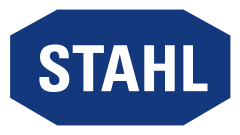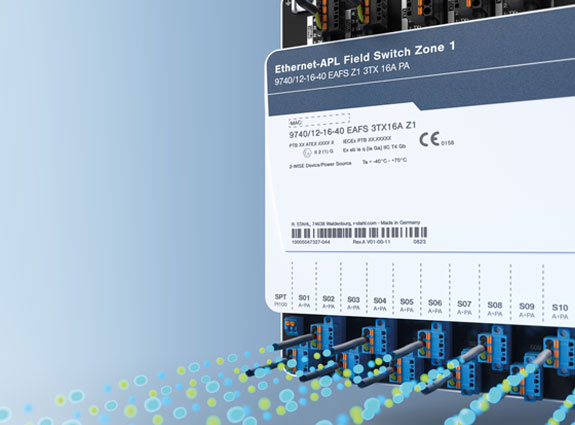Poster – Explosion protection at a glance!
The growing trend of using green hydrogen is enticing numerous players onto the market. To ensure that systems and plants are safe, they not only need Ex devices, but also, most importantly, knowledge. This is where the explosion protection experts at R. STAHL step in. Colin Liversage, Regional Sales Director Europe & Managing Director UK, explains why the company focuses more on tradition than innovation in this sector, as well as the role that the new solar park at the company's headquarters in Waldenburg can play in the process.
Mr Liversage, you spent more than two decades working for different companies in the Middle East. The obvious assumption here is that a lot of this was related to oil. Yet here we are talking about hydrogen.
Colin Liversage: Yes, hydrogen is one of the growth areas that R. STAHL is currently focusing on. Three years ago, we saw a massive shift away from traditional fossil fuel business. The North Sea started to slow down as far as projects were concerned. It became very evident that we had to start thinking differently. If we continued to put all our eggs in the traditional oil and gas fossil fuel business, eventually we wouldn't be able to take account of new trends.
What trends are you referring to?
Colin Liversage: The biggest trend is to work towards environmental sustainability, to look for greener energies. Even green energy sources can, under some circumstances, be dangerous. That's exactly where we come in – safety is our profession. We have therefore taken a close look at the implications of this trend, with a particular focus on the opportunities that arise for us in addressing the concerns of our customers.
Behind all this, of course, is the acknowledgement that the current climate crisis should not only lead to changes in the behaviour of governments and citizens. Businesses are also being asked to contribute to climate protection. What is R. STAHL doing?
Colin Liversage: It's very simple for any company to rebrand itself with a new "green" image. But having a strategy which sees that through is quite different. It's not good enough now to just talk the talk. You've got to walk the walk as well. When a company is striving to be more efficient and greener in the way that it operates, it's really important that this is adopted right from the top of the company, by every individual employee. Sustainable production is just one element. There's a lot more that can be done. For instance, R. STAHL is currently constructing a solar park right next to our main facility in Waldenburg. This will not only cover the needs of our factory there; it will also supply additional green energy to the public grid. At the same time, we will focus on electromobility, by providing up to 50 charging points for electric vehicles in our fleet, as well as for employees and visitors. We are also working on a storage solution for hydrogen.
This means that we aren't just talking about being a green company. We will have the opportunity to bring customers to our energy facilities and show them what that means in reality. I think that's really important. As a company that has traditionally worked with the oil and gas industry – the less environmentally conscious side of the market, so to speak – R. STAHL is thinking and acting in the interests of our planet and its future.
Has this also had an effect on your products?
Colin Liversage: Of course. A lot of the product generations that we are producing at the moment consume significantly less energy than previous products. For our remote I/O system IS1+, for example, this difference is around 20 percent.
What else can R. STAHL do to combat climate change?
Colin Liversage: We can pass on our experience to other companies. After all, the decarbonisation of the industry needs to continue. Using our products, as well as our expertise, we can help other businesses to reduce their carbon emissions. Our most recently formed business unit, Service, conveys this knowledge in the form of consultancy services. In the hydrogen economy, in particular, where there are a number of new players, this can benefit a huge number of organisations.
Where is the hydrogen economy now? Is it still in the early stages of development?
Colin Liversage: At first glance, it might seem like a niche sector. However, the sector is rapidly developing and growing out of its niche role. I think that new H2 technologies are the future, without a doubt. As a storage medium for volatile, renewable energy, hydrogen is an absolute must to ensure that the energy revolution succeeds. If it is consumed via fuel cells, no CO2 is released. It is the ideal energy source for processes in the chemical industry, as well as the glass, steel and cement sectors, among others. However, it is also suitable for domestic and industrial heating systems, which are currently one of the largest contributors to CO2. Hydrogen is sure to become more and more important in transportation. In this sector, the use of hydrogen makes the most difference in terms of reducing CO2 footprints. This means that investments can achieve more here.
How does R. STAHL make a difference here?
Colin Liversage: We can make a real difference in this new green energy production sector. Not only that, but we can do this with our existing safety solutions. Using our explosion protection products, we can guarantee safety within systems in the hydrogen economy just as successfully as we have done for decades in all possible systems that use explosive, combustible products.
The regulations on explosion protection are strict. Are existing standards enough for the construction and operation of hydrogen systems, or is there a need for improvement?
Colin Liversage: The existing standards are definitely sufficient to cover the majority of applications. However, hydrogen has specific properties and therefore both the IEC and ISO international standardisation organisations are in the process of developing specific standards focusing on the production and use of hydrogen. In this respect, too, our employees are able to make significant contributions – primarily Prof. Thorsten Arnhold, who leads the Strategy & Technology department at R. STAHL and has been a member of the IECEx board for a long time.
When you look at your product range, which products are especially important when it comes to the construction of hydrogen systems?
Colin Liversage: In the hydrogen economy, we consider devices in explosion group IIC or, at a minimum, IIB+H2 to be necessary. The majority of the products that we manufacture meet these standards. We have extensive experience in what we do. Our products have been tried and tested. To bring them onto a new market, accompanied by the same promise of safety that we have offered to the oil and gas market for decades – that is our task. There is great demand for our automation products, since the field of automation is particularly challenging and requires expert consultation.
Are you expecting a boost for your business?
Colin Liversage: It's not going to happen overnight. It's a long process. But what we do know is that you have to be an early engager. This is why we've really been looking at many different alternative energy sources, as well as working with universities, government think tanks, and businesses. Some of them are implementing applications and learning how to construct a hydrogen plant in practice. I think we can contribute in that we make them aware of the huge importance of explosion protection when dealing with a combustible, volatile gas.
How does your organisation need to change in order to reach new markets?
Colin Liversage: Recently, our sales staff have had a lot to learn; they have had to internalise the new, environmentally friendly ethos of our company. After all, it's not just the applications that are changing – our contacts are changing as well, even if it seems that we are working with the same customers. This is the case, for instance, in the EPC (Engineering, Procurement and Construction) business. We know the EPC companies that have been operating in the oil and gas sector up to now very well, and they know us well. We are on approved lists almost extensively. Now, new departments dedicated to the hydrogen market are being created within these companies. The people employed there tend to have a different mindset – they are very aware of the changing future dynamics and more environmentally conscious. They are people who are very passionate about this particular aspect of the energy revolution. We need to be able to have equal, educated conversations with them about hydrogen and what it means for the energy transition, for consumers and for investors.
After being obtained, hydrogen needs to be transported, temporarily stored, perhaps converted to other products, or supplied to a fuel cell to generate power. Where do you see the greatest potential for R. STAHL?
Colin Liversage: From a short-term perspective, I see the greatest potential for the use of our Ex devices in the production of green and blue hydrogen. As that value chain then develops, for instance if more and more refuelling systems are constructed, our close collaboration with different OEMs who construct similar systems will continue to bear fruit. In the medium term, this offers huge potential. The future also belongs to additional power-to-X technologies, such as production systems for ammonia and synthetic fuels. Explosion protection will be indispensable here.
There are currently a lot of hydrogen start-ups out there. How will you reach them?
Colin Liversage: You're right. Many newly founded businesses have seen that there is a growing market here; they deal with innovative ideas. When things get specific and safety becomes the topic of conversation, this often gives rise to questions and uncertainty. Typically, this is due to a lack of traditional explosion protection knowledge. That's where we step in with our expertise. Thanks to our knowledge, advice and products, we are able to help them. This is the message we are communicating via social media, as well. It's a very different marketing task, compared to our communication with our traditional customer base. When talking to these customers, we discuss the changes and what they will mean for both them and us. When we deal with the newly formed departments within these companies, we talk about how we can support and advise them when designing new applications. When it comes to new start-ups, we first need to make sure that we grab their attention, before demonstrating that we can help them ensure safety in all of their upcoming innovations.






![[Translate to Englisch:] [Translate to Englisch:]](/fileadmin/user_upload/mitarbeiter/01_DE/07_Blog/00_Allgemein/blog-explosionsschutz-rstahl-startseite-279x205.jpg)
![[Translate to Englisch:] [Translate to Englisch:]](/fileadmin/user_upload/mitarbeiter/01_DE/07_Blog/00_Allgemein/blog-explosionsschutz-rstahl-ueber-den-blog-279x205.jpg)
![[Translate to Englisch:] [Translate to Englisch:]](/fileadmin/user_upload/mitarbeiter/01_DE/07_Blog/00_Allgemein/blog-explosionsschutz-rstahl-autoren-279x205.jpg)
![[Translate to Englisch:] [Translate to Englisch:]](/fileadmin/user_upload/mitarbeiter/01_DE/07_Blog/00_Allgemein/blog-explosionsschutz-rstahl-newsletter-expert-mail-279x205.jpg)
Write new comment